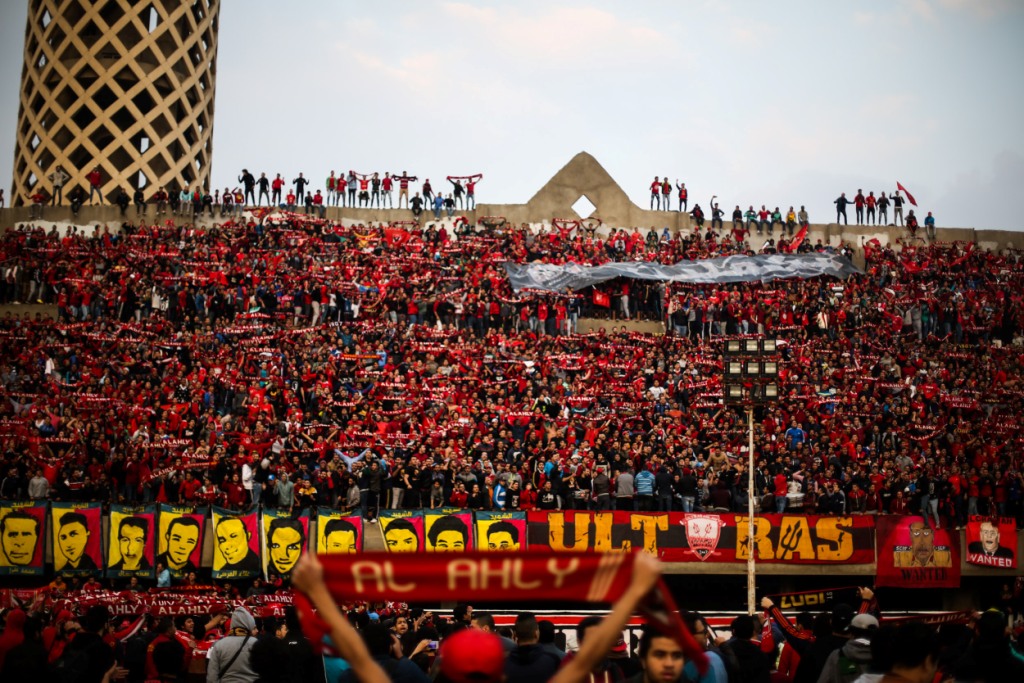Latest NEWS
- Aswat Masriya, the last word
- Roundup of Egypt's press headlines on March 15, 2017
- Roundup of Egypt's press headlines on March 14, 2017
- Former Egyptian President Hosni Mubarak to be released: lawyer
- Roundup of Egypt's press headlines on March 13, 2017
- Egypt's capital set to grow by half a million in 2017
- Egypt's wheat reserves to double with start of harvest -supply min
- Roundup of Egypt's press headlines on March 12, 2017
'Ultras Ahlawy' remains defiant 4 years after deadly Port Said violence

By Nourhan Fahmy
CAIRO, Feb. 3 (Aswat Masriya) – The Ultras Ahlawy fan group reiterated demands for retribution this week, four years after a football stadium turned into a crime scene and over 70 people were killed in the Egyptian city of Port Said in February 2012.
Cairo's Al Ahly and Port Said's local al-Masry football clubs were playing in what was a tense but normal game, until it ended. When the referee blew the final whistle, the scene which was aired live on television, suddenly turned chaotic.
Sports shows that typically discuss team performance, tactics and possession were instead dominated with talk on the rising number of deaths.
The Al Ahly fans who had traveled from across Egypt to watch the game up close, left the city 74 fans short, according to the death toll provided by the head of Eygpt's ambulance authority at the time in a statement to state run newspaper Al-Ahram.
Seventy-three defendants faced trial for the incident including nine security leaders and three Masry club officials, and in June 2015 a court ruled on the case issuing sentences ranging from death to a year.
On Monday which coincided with the fourth anniversary of the deadly violence, hundreds of Ultras Ahlawy fans staged a memorial in one of Al Ahly sporting club's stadiums, where they chanted against the interior ministry. They also echoed slogans against the Supreme Council of the Armed Forces (SCAF), who ruled the country during the time of the fatal football match.
After the emotionally-charged memorial, Egyptian President Abdel Fattah al-Sisi spoke to the popular talk show "al-Qahira al-Youm" in a live phone interview, where he specifically addressed the demands of the Ultras group.
Sisi proposed restarting an investigation into the deadly incident with the help of 10 Ultras Ahlawy members "who will be requested to reveal information regarding the incident and will be made aware of the outcome of investigations already done."
Ultras Ahlawy, which has for long been defiant of authorities, expressed reservations on the president's proposal in a statement published Tuesday night on their Facebook page. They maintained that they were not the ones to "judge" on the matter.
Ahmed Abd Rabou, a visiting scholar at the University of Denver and assistant professor of political science at Cairo University, told Aswat Masriya that the Ultras' response "simply returned the ball to the president", describing it as "subtle and mature."
"We should differentiate between 'containment' and 'maneuvering'", Abd Rabou said. He maintained that the president has been adopting the latter rather than the former.
The "real job" that the president needs to do is to investigate and prosecute the "real people behind the massacre", Abd Rabou added.
The Ultras group stressed that the investigation must be made include all parties, security officials included.
The group added that hurdles before the investigations must be overcome and the evidence shown to the public, in order to "put matters into perspective and restore rights to their holders."
Meanwhile, Al Ahly's management issued a statement Monday evening rejecting offences against state institutions, particularly the police and the army in reference to the memorial event.
Ultras Green Eagles, hard core fans of al-Masry club, published a statement on the anniversary of the stadium riots, lamenting the "continued injustice" and what they perceive as the "fabrication" of reality.
An Egyptian urgent matters court banned the activities of all Ultras fan groups nationwide in May 2015, accusing them of complicity in "riots" and vandalism.
Abd Rabou believes that the president speaking directly to a "dissident group" like the Ultras is a positive sign, signaling that he finally understands that his current politics are not productive.
He suggested that the president has been previously adopting a "dual strategy" when dealing with "youth" whereby there was an attempt to establish a new discourse of loyalty and in parallel implement a harsh crackdown on "dissidents" including Ultras groups.
But due to what Abd Rabou perceives as a failure of the "dual strategy", the president is shifting towards a new one "that seems soft but in reality covers the same aim: how can we [the state] cut off those activists from their grassroots and supporters."










